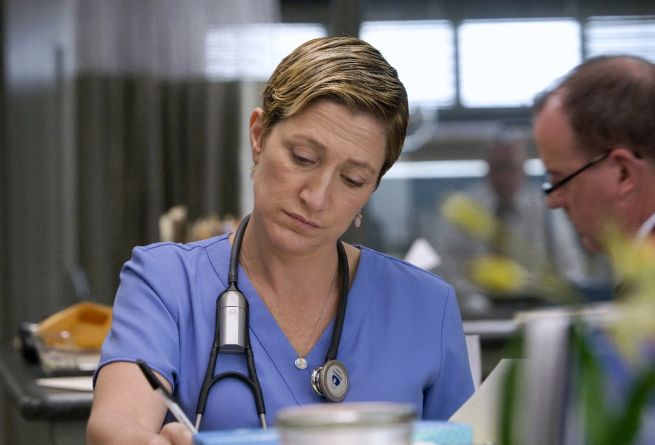Finally, Hospitals' Unsung Heroes Carry the Show

Editor's Note: This article was originally printed June 18, 2009 in The Boston Globe.
Since the birth of television, Hollywood has given doctors a permanent starring role in prime-time hospital dramas. But most doctor shows have relegated the nation’s largest healthcare profession - nursing - to the status of bit players. Whether it was “Marcus Welby, M.D.’’ or “St. Elsewhere,’’ TV routinely presented RNs as mere handmaidens of physicians. In more contemporary shows like “Grey’s Anatomy,’’ “The Practice,’’ and “House,’’ medicine is now full of ethnic, racial, and gender diversity. Unfortunately, there’s hardly ever a nurse in the house.
That’s why it’s so remarkable that two new shows put the spotlight on a nurse. In TNT’s “HawthoRNe,’’ Jada Pinkett Smith is a chief nurse who’s smart and feisty. Showtime’s “Nurse Jackie’’ --played by Edie Falco--displays an edgier and far more realistic view of nursing.
In each show, we see the challenges of modern nursing depicted in an unprecedented way. In the first episode of the Showtime series, a young bike messenger is brought into the emergency room at NYC's "All Saints Hospital" after being hit by a car. Because she’s a veteran RN, Jackie knows the boy has a brain bleed but a cocky young doctor blows her off and fails to treat it. The patient dies. In episode two, an angry man storms into the ER and socks Jackie in the jaw. Jackie figures out that the guy isn’t crazy, just distraught. He’s taking care of an obese, diabetic mother - a double leg amputee - all by himself. Jackie gets him an overnight stay and calls in social services.
“Hawthorne’’ is smart but a little too saintly, and Pinkett Smith is a one-note actress. “Nurse Jackie,’’ however, is a real gift to the nursing profession. The series reveals the critical role nurses play in healthcare and the price they pay for their expertise and commitment to patients. Jackie self-medicates because she injured her back on the job and is in constant pain. (In the real world, 6 to 11 percent of all nurses leave hospital work because of back, neck, and shoulder injuries). She’s a stressed-out recovering alcoholic. (Because of the pressures of their work, more nurses do, in fact, have higher rates of stress-related illness, depression, and even suicide than the rest of the population.)

SUPPORT LABOR NOTES
BECOME A MONTHLY DONOR
Give $10 a month or more and get our "Fight the Boss, Build the Union" T-shirt.
In spite of all this - and here Jackie may be functioning better than some real-life RNs - she’s worn out, but not burnt out. Like the best nurses I know, she displays deep compassion for her patients but without a shred of sentimentality. When a nursing student confesses to being unsure whether she’s cut out for the work, Jackie takes her aside and let’s her in on the secret of work in a modern hospital:
“You know what this job is honey, this job is wading through a shitstorm of people who come here on the very worst day of their lives. And just for your information, doctors are here to diagnose, not heal. We heal. And All Saints is in the business of flipping patients, that’s it, end of story. The fact that you have even the slightest inclination to help people puts you miles ahead of 100 percent of the population. So buck up.’’
Nurses are already reacting to nursing’s star turn. Three RN unions, including the Massachusetts Nurses Association, ran ads during commercial breaks on the first episode of “HawthoRNe,’’ advocating safe staffing legislation. And the blogosphere is buzzing with rank-and-file feedback on Jackie’s human foibles. Some RNs are upset that Jackie may hurt the image of their profession. The New York State Nurses Association is even demanding that the show’s producers run a disclaimer stating that Jackie violates nursing ethics.
To focus on Jackie’s flaws, however, is to miss the point. Most television doctors are oversexed, self-absorbed, and idiosyncratic. But when it’s time for diagnosis and treatment, they’re brilliant. Even though TV is supposed to be just entertainment, shows like “Nurse Jackie,’’ and even “HawthoRNe,’’ can help convince the public that nurses matter. Not just because they’re kind, sweet, and selfless but because they have the knowledge and skill that often makes the difference between life and death.
Suzanne Gordon is author of “Nursing Against the Odds" and many other books about health care and nursing.



